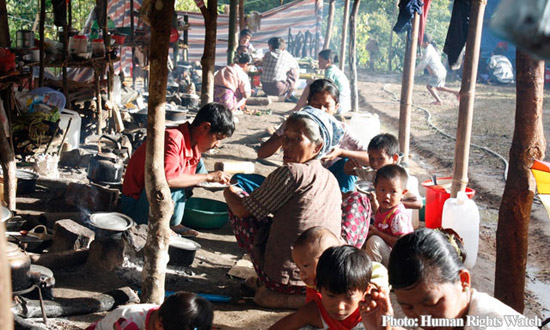A rice shortage is compounding the plight of Kachin refugees, the UN Office for the Coordination of Humanitarian Affairs said on Friday.
The annual harvest season in northern Kachin State has come and gone but much of the rice crop has not been harvested or was never planted because of the renewed fighting, the UN group said on its website.

Traditionally, farmers transfer their rice seedlings in June with harvests in November and December before the winter sets in.
"This year's harvest was next year's investment, but now we have nothing for the future. We will have to cross the mountains and scavenge for wild vegetables so that we will have something to eat," said Kot Nan, 35.
"When the conflict started we were planting rice but the soldiers came into our village so we couldn't plant," said the mother-of-two told at the main camp for internally displaced people (IDPs) outside Laiza.
There are more than 40,000 IDPs in Kachin State, local aid groups say, including an estimated 20,000 in camps around Laiza, controlled by the political wing of the KIO.
For many Kachin families, farming is the primary source of livelihood, with rice being the main crop, along with sugar cane and corn.
Bill Davies, a researcher with Physicians for Human Rights (PHR), was quoted on the UN website that the food security issue is of major concern.
Davies led a fact-finding mission for PHR in the border areas of Kachin State last September, visiting six camps and four shelters for IDPs.
But getting into the most-affected areas will only be the first step, said Marcus Prior, a spokesman for the World Food Programme (WFP) Asia.
"Even with improved access, WFP will need funding to provide the kind of assistance we think may be necessary in Kachin," he said. "Our operations across the country are facing significant shortfalls – right now WFP only has funds to guarantee food deliveries into February."
The UN food agency is able to reach about 15,000 of the displaced in Kachin State, but hopes that following a recent humanitarian convoy across the conflict line, the next convoy will include WFP food, Marcus said.


